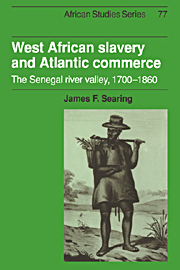Book contents
- Frontmatter
- Contents
- List of maps
- Preface
- Map 1 The Lower Senegal in the eighteenth century
- 1 Cosaan: “the origins”
- 2 Slavery and the slave trade in the Lower Senegal
- 3 The Atlantic kingdom: maritime commerce and social change
- 4 Merchants and slaves: slavery on Saint Louis and Gorée
- 5 Famine, civil war, and secession, 1750–1800
- 6 From river empire to colony: Saint Louis and Senegal, 1800–1860
- Conclusion
- Notes
- Index
- TITLES IN THE SERIES
2 - Slavery and the slave trade in the Lower Senegal
Published online by Cambridge University Press: 19 October 2009
- Frontmatter
- Contents
- List of maps
- Preface
- Map 1 The Lower Senegal in the eighteenth century
- 1 Cosaan: “the origins”
- 2 Slavery and the slave trade in the Lower Senegal
- 3 The Atlantic kingdom: maritime commerce and social change
- 4 Merchants and slaves: slavery on Saint Louis and Gorée
- 5 Famine, civil war, and secession, 1750–1800
- 6 From river empire to colony: Saint Louis and Senegal, 1800–1860
- Conclusion
- Notes
- Index
- TITLES IN THE SERIES
Summary
In the late seventeenth century a new era began in the Lower Senegal. For the first time in the history of the region, the driving force of change came from outside of the region, from beyond the sea, as the Lower Senegal became a gateway to Africa for expanding colonial empires of the Atlantic world. The Atlantic economy literally reached into Senegambia, and became a dynamic force which put people and goods into motion, transforming the economy and reshaping the geography of wealth and power to suit its own needs and its own logic. The era of the Atlantic slave trade in Africa began in the sugar plantations of America. The sugar revolution drove the wheels of mercantilist capitalism like a mighty wind, propelling ships and cargoes of trade goods to the shores of West Africa, where the Atlantic world purchased the slaves whose sweat and blood fed the engines of economic growth. Ships from the Atlantic poured manufactures from Europe, Asia, and America into the ports and rivers that carried them further inland and gathered the harvest of men, women, and children that flowed with the floodwaters of the rivers towards the sea.
It was the scale of the force exerted by the Atlantic trade which changed in the late seventeenth century. The great Atlantic powers, Britain and France, competed directly for the slaves of Senegambia for most of the eighteenth century, throwing not only their economic might, but also the power of their naval fleets into the balance. The result was the partition and repartition of the Senegambian coast into exclusive commercial spheres of influence, which were periodically redrawn in accordance with the fortunes of war.
- Type
- Chapter
- Information
- West African Slavery and Atlantic CommerceThe Senegal River Valley, 1700–1860, pp. 27 - 58Publisher: Cambridge University PressPrint publication year: 1993



